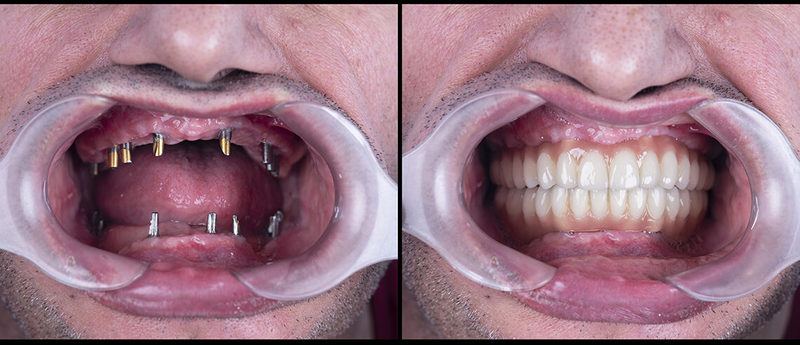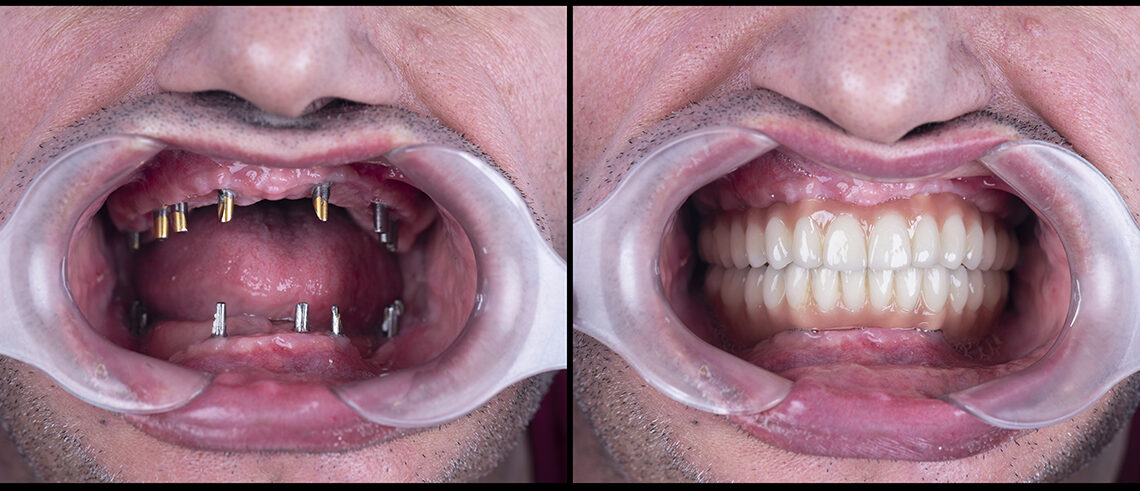
So, you’re wondering if it’s possible to get dental implants when you have no teeth? Well, let me put your mind at ease and give you the scoop on this intriguing topic. Dental implants have revolutionized the field of dentistry, offering a viable solution for individuals who have lost all their teeth. Yes, you heard that right! Even if you have no teeth, dental implants can still be an option for you.
Now, you might be wondering how this is even possible. After all, don’t dental implants require teeth to anchor onto? Well, here’s the fascinating part. Dental implants are actually titanium posts that are surgically placed into the jawbone, where they act as artificial tooth roots. These posts are incredibly durable and provide a strong foundation for replacement teeth, even if you don’t have any natural teeth left. So, whether you lost your teeth due to decay, gum disease, or an accident, dental implants can help restore your smile and improve your quality of life. But before we delve deeper into the world of dental implants, let’s explore the process and benefits of this remarkable dental procedure.
Can You Get Dental Implants If You Have No Teeth?
If you have no teeth, you may be wondering if dental implants are still an option for you. The good news is that dental implants can be a solution even if you have no teeth. However, the process may be a bit more involved. Your dentist will evaluate your jawbone density and may recommend bone grafting to ensure a stable foundation for the implants. Once the implants are placed, a customized set of dentures or dental bridges can be attached to restore your smile and improve your quality of life.

Can You Get Dental Implants If You Have No Teeth?
In the world of dentistry, dental implants have revolutionized the way we can replace missing teeth. But what about those who have lost all of their teeth? Can they still benefit from dental implants? The answer is yes, you can get dental implants even if you have no teeth. In fact, dental implants can be a life-changing solution for individuals who have lost all of their natural teeth. In this article, we will explore the possibilities of dental implants for people with no teeth and discuss the benefits they offer.
Understanding Dental Implants
The Benefits of Dental Implants for Individuals with No Teeth
Now that we understand the process of getting dental implants without teeth let’s explore the benefits they offer:
- Improved Function: Dental implants allow you to regain the ability to eat, speak, and smile with confidence. They provide a stable and secure foundation for artificial teeth, eliminating the discomfort and inconvenience often associated with traditional dentures.
- Natural Appearance: Dental implants are designed to look and feel like natural teeth. With the help of advanced dental technology, your dental implant specialist will ensure that your new teeth blend seamlessly with your remaining natural teeth, giving you a beautiful and natural smile.
- Bone Preservation: When teeth are missing, the jawbone can start to deteriorate over time. Dental implants stimulate the jawbone, preventing bone loss and maintaining facial structure. This not only improves oral health but also enhances overall facial aesthetics.
- Longevity: With proper care and maintenance, dental implants can last a lifetime. Unlike traditional dentures, which may need to be replaced or adjusted over time, dental implants provide a permanent solution for missing teeth.
- Improved Quality of Life: Dental implants have a significant impact on an individual’s quality of life. They restore the ability to eat a wide variety of foods, speak clearly, and smile confidently, improving self-esteem and overall well-being.
Conclusion
Dental implants are a viable option for individuals who have no teeth. They provide a permanent, natural-looking solution for replacing missing teeth and offer numerous benefits, including improved function, enhanced aesthetics, and preservation of the jawbone. If you have lost all of your teeth and are considering dental implants, consult with a dental implant specialist to determine the best treatment plan for your unique needs. With dental implants, you can regain your smile and enjoy the benefits of a healthy, beautiful set of teeth.
Key Takeaways: Can You Get Dental Implants If You Have No Teeth?
- Dental implants are a possible solution for individuals who have no teeth.
- Implants can provide a stable and natural-looking foundation for dentures or bridges.
- The process involves surgically placing implant posts in the jawbone.
- After the implants heal, custom-made dentures or bridges can be attached.
- Consulting with a dental professional is crucial to determine if you are a suitable candidate.
Frequently Asked Questions
Can dental implants be placed if you have no teeth?
Yes, dental implants can be placed even if you have no teeth. In fact, dental implants are an excellent option for individuals who have lost all of their natural teeth. The implant procedure involves surgically placing titanium posts into the jawbone, which serve as artificial tooth roots. These posts provide a stable foundation for the placement of dental crowns or dentures.
With the advancements in dental implant technology, there are various options available for individuals with no teeth. Implant-supported dentures, also known as full arch implants, can be used to replace a full set of teeth. These dentures are securely attached to the dental implants, offering improved stability and comfort compared to traditional removable dentures.
What are the benefits of dental implants for individuals with no teeth?
Dental implants offer several benefits for individuals with no teeth. Firstly, they provide a natural-looking and functional replacement for missing teeth. The dental crowns or dentures attached to the implants are custom-made to match the shape and color of your natural teeth, resulting in a beautiful smile.
Furthermore, dental implants help preserve the jawbone by stimulating bone growth. When natural teeth are lost, the underlying jawbone can deteriorate over time. Implants prevent this bone loss and maintain the integrity of the facial structure. Additionally, dental implants allow for improved speech and chewing ability, enhancing overall quality of life.
Are dental implants suitable for everyone with no teeth?
Dental implants are a suitable option for most individuals with no teeth. However, certain factors may affect the candidacy for dental implants. The overall oral health of the individual, including gum health and bone density, plays a crucial role in determining suitability for implants.
If there is insufficient bone in the jaw to support the implants, bone grafting may be necessary to build up the bone density. Additionally, individuals with certain medical conditions or habits such as smoking may require extra precautions or may not be ideal candidates for dental implants. It is best to consult with a qualified dentist or oral surgeon to assess individual suitability for dental implants.
How long does the dental implant process take for individuals with no teeth?
The dental implant process can vary depending on individual cases, but it typically involves several stages and can take several months to complete. The initial stage involves the surgical placement of the implant posts into the jawbone, which requires a healing period of a few months to allow the implants to fuse with the bone.
After the healing period, the next stage involves the placement of the dental crowns or dentures onto the implants. This step may require additional appointments for fittings and adjustments. The overall timeline can vary based on the complexity of the case and the individual’s healing process.
What is the success rate of dental implants for individuals with no teeth?
The success rate of dental implants for individuals with no teeth is generally high. According to studies, the success rate of dental implants ranges from 95% to 98%. However, individual factors such as oral hygiene, overall health, and adherence to post-implant care instructions can influence the long-term success of dental implants.
Regular dental check-ups, proper oral hygiene practices, and avoiding habits that may damage the implants, such as biting on hard objects, are essential for maintaining the longevity of dental implants. Consulting with a skilled dental professional and following their guidance can significantly contribute to the success and durability of dental implants.
Can you have Dental Implants with 80% Bone Loss
Final Summary: Can You Get Dental Implants If You Have No Teeth?
Dental implants are a viable solution for individuals missing all teeth, offering a lifelike and durable option. Advanced technology enables customized treatment plans. Whether one tooth or a full set is missing, implants provide long-term functionality. Consulting with a dentist is crucial for tailored advice. Embrace a confident smile with dental implants’ transformative potential.
Call or Book appointment online
:Ace Dental Care Alpharetta office: 678-562-1555 - Book Now
Ace Dental Care Norcross office: 770-806-1255 - Book Now
Disclaimer
This blog post was generated by artificial intelligence. The content of this post may not be accurate or complete, and should not be relied upon as a substitute for professional advice. If you have any questions about the content of this post, please contact us.
We are constantly working to improve the accuracy and quality of our AI-generated content. However, there may still be errors or inaccuracies. We apologize for any inconvenience this may cause.





